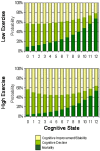Changes in cognition and mortality in relation to exercise in late life: a population based study
- PMID: 18769616
- PMCID: PMC2518854
- DOI: 10.1371/journal.pone.0003124
Changes in cognition and mortality in relation to exercise in late life: a population based study
Abstract
Background: On average, cognition declines with age but this average hides considerable variability, including the chance of improvement. Here, we investigate how exercise is associated with cognitive change and mortality in older people and, particularly, whether exercise might paradoxically increase the risk of dementia by allowing people to live longer.
Methods and principal findings: In the Canadian Study of Health and Aging (CSHA), of 8403 people who had baseline cognition measured and exercise reported at CSHA-1, 2219 had died and 5376 were re-examined at CSHA-2. We used a parametric Markov chain model to estimate the probabilities of cognitive improvement, decline, and death, adjusted for age and education, from any cognitive state as measured by the Modified Mini-Mental State Examination. High exercisers (at least three times per week, at least as intense as walking, n = 3264) had more frequent stable or improved cognition (42.3%, 95% confidence interval: 40.6-44.0) over 5 years than did low/no exercisers (all other exercisers and non exercisers, n = 4331) (27.8% (95% CI 26.4-29.2)). The difference widened as baseline cognition worsened. The proportion whose cognition declined was higher amongst the high exercisers but was more similar between exercise groups (39.4% (95% CI 37.7-41.1) for high exercisers versus 34.8% (95% CI 33.4-36.2) otherwise). People who did not exercise were also more likely to die (37.5% (95% CI 36.0-39.0) versus 18.3% (95% CI 16.9-19.7)). Even so, exercise conferred its greatest mortality benefit to people with the highest baseline cognition.
Conclusions: Exercise is strongly associated with improving cognition. As the majority of mortality benefit of exercise is at the highest level of cognition, and declines as cognition declines, the net effect of exercise should be to improve cognition at the population level, even with more people living longer.
Conflict of interest statement
Figures





References
-
- Rockwood K, Middleton L. Physical activity and the maintenance of cognitive function: Epidemiology. Alzheimer Dement. 2007;3(2):S38–S44. - PubMed
-
- Broe GA, Creasy H. Health habits and risk of cognitive impairment and dementia in old age: A prospective study on the effects of exercise, smoking and alcohol consumption. Aust NZ J Public Health. 1998;22(5):621–3. - PubMed
-
- Kramer AF, Erickson KI. Effects of physical activity on cognition, well-being, and brain: Human interventions. Alzheimers Dement. 2007;3(2):S45–S51. - PubMed
-
- Cotman CW, Berchtold NC, Christie LA. Exercise builds brain health: key roles of growth factor cascades and inflammation. Trends Neurosci. 2007;30(9):464–72. - PubMed
-
- Kay DWK. Impairment, disability and dementia. Int J Geriatric Psychiatry. 1991;6:827–31.
Publication types
MeSH terms
LinkOut - more resources
Full Text Sources
Medical
Research Materials

